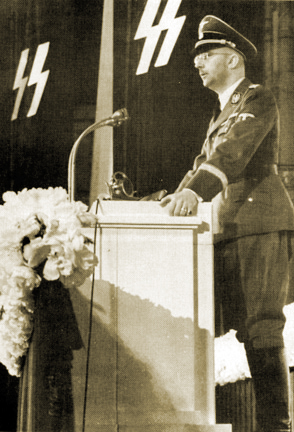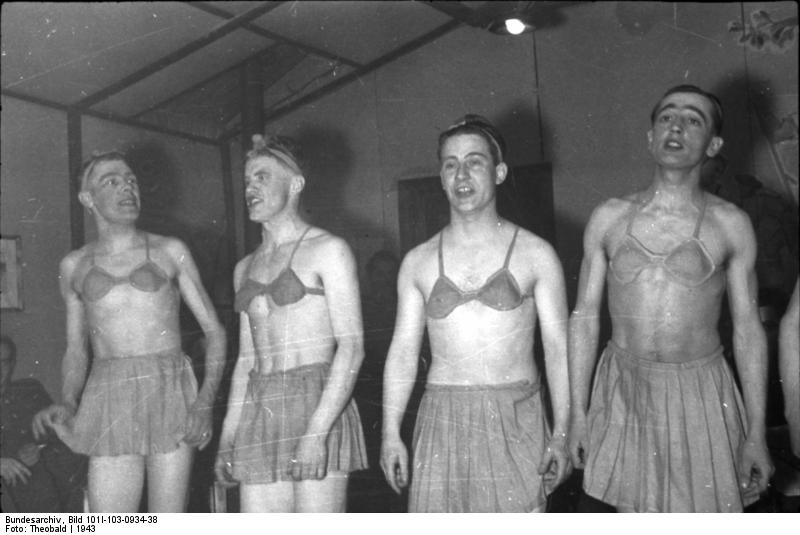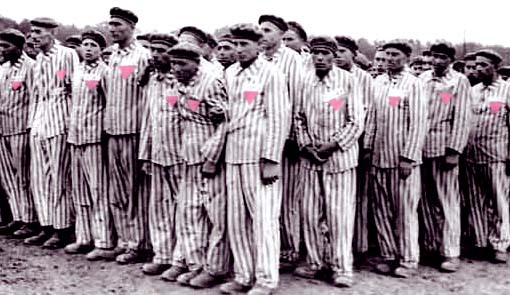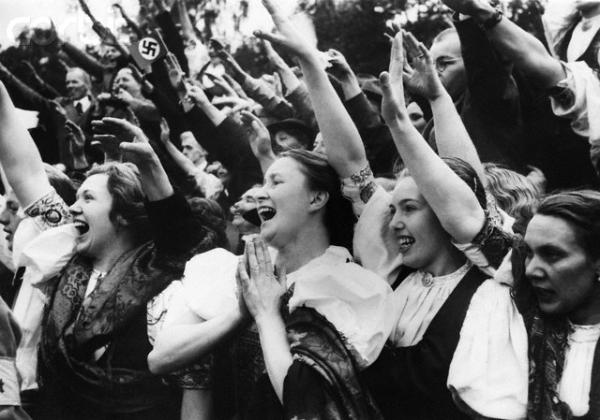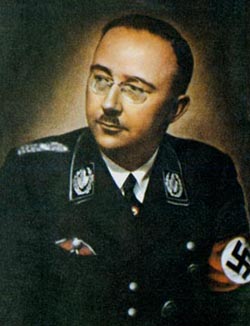This is my "Final report" about my compilation
of articles in The Fair race's Darkest Hour:
Virtually all white males have been brainwashed about what really happened in the Second World War. To boot, they have been feminized. Characterologically they are basically the antipodes of the Spartans, the Vikings or Himmler’s SS men. Even white nationalists are reluctant to repudiate the conquests of “feminism,” and by this I don’t only have in mind allowing women to vote (keep in mind the last paragraphs of Yockey’s essay), but allowing their “right” to inherit wealth or property (also keep in mind what we said about Austen’s novels and the causes of Greco-Roman decline in Pierce’s long text).
The humiliating empowerment of white women throughout the West is directly proportionate to the cretinization of white males. Now that I reproduced my translations about the prime example of polar Yang in Aryan history, Sparta, I would like to qualify that what we need is Aristotle’s proverbial golden mean. Sparta produced the best soldiers in world history but perished because it ignored what we now know: that enslaving non-whites is fatal in the long run. What we need is the Hegelian synthesis between yang Sparta and yin Athens: a sort of modern Rome. That is exactly what National Socialism was all about. Inspired in Rome, and let us remember the virile Roman salute, the Third Reich incorporated and eliminated—Hegel’s aufheben—the contradictions in both extremes: it was highly cultured as well as a tough military state.
I consider myself a spiritual inheritor of the Nationalist Socialist legacy. But I reject neonazism. Why?
Because neonazis are basically white nationalists plus Nazi paraphernalia. We have already seen that, unlike the NS men, these groups love degenerate music, Judaized Hollywood and non-reproductive sex. Many of these décadents are also anti-Nordicists who would dismiss the command cited in the very first lesson of Stellrecht’s Faith and Action already quoted in previous pages: “But if your blood has traits that will make your children unhappy and burdens to the state, then you have the heroic duty to be the last.”
The surreal thing is that even the pure Aryans hate Nordicism. Conversely what I love about Himmler is that, precisely because he was not handsome, he admired the hyper-Nordics of a Norwegian town he visited and harbored the thought that its people could become a paradigm for the Reich. Remember Stubb’s words about white nationalists:
Not only does it [Nordicism in general and National Socialism in particular] retrigger all the anti-racist conditioning they thought they’d gotten rid of, but it makes them ask “where does it end?” “At what point can we finally stop paying attention to each others genetic (and non-genetic) flaws?”
The answer is that it doesn’t end: that all life is struggle and hierarchy and that the Aryan race will never be perfected nor entirely freed from threats. But that’s not what they want to hear. Pierce made eugenics the core of his religious outlook as a means of protecting the eugenically-selecting society. But I see little concern for the subject among modern white nationalists. Can you imagine a racial state with a comprehensive eugenic policy which didn’t consider the reversal of mongrelization to be a major objective? [Stellrecht’s “heroic” advice] That it wouldn’t make its population look more like Swedes and less like Sicilians, as time goes on? It’s hard to do so, which is why I believe “anti-Nordicism” in white nationalism has, among other things, shut down much of the discussion on the subject.
On September 2013, in Harold Covington’s Northwest Front blogsite, several commenters subscribed politically correctness by bashing Covington in order not to offend the feelings of contemporary Greeks. A saner Northwest Front commenter said, “Those among us who don’t have the ability to look at a picture of half-Turks and tell they’re not White weren’t ever going to amount to anything on behalf of the White race.” The other side, the “revolutionary” neonazis, ignored that DNA tests have even revealed nigger genes among quite a few of the Portuguese; and we have already seen El Greco’s painting of crossbreed Spaniards as well as Pierce’s statement that “a 5 percent decline in average IQ would cause our civilization to collapse,” which applies to Sicily and Greece even before the Turkish invasion.
This cowardly lack of recognition of the very Letter A in Indo-European studies is not the only thing that annoys me about the embryonic movement known as white nationalism. Over the internet boards I find it bothersome when typical neonazis demand that I dismiss the Holocaust stories as hoax; and that if I fail to do it my morals are beyond the pale.
As someone who has spent many years studying controversial subjects (the pseudoscience in both parapsychology and biological psychiatry), I know perfectly that you must spend at least a decade of your life trying to digest the scholarly literature of both sides of an academic debate. I am in my middle fifties now and don’t have the time nor the motivation to research the Holocaust claims and counter-claims. For me it is enough to point out that two former Holocaust revisionists, Mark Weber, the director of the Institute of Historical Review, and David Irving, our best historian of the Third Reich, have changed their minds over the years, both accepting now that a few millions of Jews probably died during the war. Irving’s forthcoming book on Herr Himmler quotes historical records proving that, even though the six-million figure is an invention, a couple of millions of Jews probably died as a result of harsh Nazi treatments.
David Irving in 2012
But I would like to go beyond Irving’s scruples. Rephrasing a passage of Peter Helmkamp in Controlled Burn, an Irish commenter stated in my blog: “The truth is that the glad stirrings of genocide lurk in the heart of every man, yet only the Nazis had the courage to acknowledge the truth.” Another commenter, a Swede, went even further:
What is certain is that the Holocaust would not have produced any debilitating psychological effect on non-Christian whites. (By Christianity I mean “Christian morality.” Most atheists in the West are still Christian, even if they don’t believe in God or Jesus.) Being emotionally affected by the Holocaust presupposes that you think:
1) Victims and losers have intrinsically more moral value than conquerors and winners
2) Killing is the most horrendous thing a human can do
3) Killing children and women is even more horrendous
4) Every human life has the same valueNone of these statements ring true to a man who rejected Christian morality. In fact, even if the Holocaust happened, I would not pity the victims or sympathize with them. If you told the Vikings that they needed to accept Jews on their lands or give them gold coins because six million of them were exterminated in an obscure war, they would have laughed at you.
It must be comical for the Nietzscheans of the North that, unlike the monocausalism ubiquitously present in the neonazi and white nationalist movement, Himmler acknowledged other factors: “Our people’s thinking was misled by the forces of the Church, Liberalism, Bolshevism, and Jewry.” And let us never forget Hitler’s own words in one of his table talks: “The heaviest blow that ever struck humanity was the coming of Christianity.” If neonazis were true Nazis and had transvalued Christian/Neo-Christian values they would be trying to demonstrate that Himmler’s Posen Speech in 1943 is genuine, not a hoax as they claim, and even find genocidal inspiration from the speech.
Of course: they will never do it because all of them are Neo-Christian pseudo-Nazis. Speaking with a little humor I would say that neonazis, white nationalists, and American southern nationalists subscribe what we may call the Harry Potter approach to the Jewish problem. Throughout those novels for children, the female author presents us a Harry who never uses “Avara Kadavra,” the killing spell against the bad guys; Harry only uses the disarming charm, “Expelliarmus.” But only in novels and movies for kids the good guys, who never are depicted as cold assassins, can win. In real life you have to make a transition to the dark side, to Himmler’s ways, to become a soldier.
I have read The Turner Diaries twice. When I read it for the first time, or rather listened the audio version with Pierce’s own voice, I was still struggling with the last remnants my Neo-Christian programming. I didn’t like the Breivik-like cruelties such as dispatching an entire group of pro-white warriors for not taking care of the Jewish problem in Toronto. And in the novel’s Day of the Rope I was troubled by the description that many innocent young whites also die. Then I read most of Covington’s Quintet and sensed a moral difference. Covington’s characters are not so bloodthirsty, not so genocidal exterminators. I could imagine myself doing the things in Covington’s novels but in the past some passages of the Diaries made me wonder…
But now that I have definitively left behind Christian axiology I can see that Pierce was ultimately right. As NS soldiers in the coming racial wars, altogether imbued in the martial qualities of gravitas and severitas, we must behave. The huge difference between the Quintet and the Diaries is that in Pierce’s world not only an ethno-state is born: in the final pages it is described that only the white race shall inherit the Earth. In Covington’s world that is dismissed because it would mean genocide on a scale not even performed by the Bolshevik Jews. But as Pierce said in Who We Are, already cited way above:
The hard lesson taught by the different results of the European colonization of North America, Latin America, Australia, New Zealand, India, and southern Africa is that the only type of colonization with lasting significance is racial colonization; and that racial colonization can succeed only when Whites are willing and able to clear the land of non-White inhabitants and keep it clear.
This item of both Who We Are and the Diaries is so strong meat that I will elaborate on it only in Day of Wrath, and in the autobiographical books in Spanish that I’ll write after the completion of the present one.
Feminist quotas in the Northwest Front
Rockwell was assassinated in 1967; Pierce died of natural death, more than thirty years later. None of them were properly white nationalists. (“White nationalism” is a term introduced in the middle 1990s for the internet.) Their worldview was much closer to the thoroughgoing Yang reaction in National Socialism against the feminizing forces of degeneracy.
Presently in the American racialist scene Harold Covington, called “The Kid” in the times of Rockwell and Pierce, is considered the most radical (“Yang”) element as ideologically he is a revolutionary, not a mere reactionary. But Covington does not believe that millions of Jews died as a result of harsh treatment by the National Socialist Germans. Unlike us, he is stuck in Neo-Christian values. (I would dare to say that the stirrings of genocide should lurk in the heart of every transvalued white, which means accepting as grim necessity what seventy years ago happened to the subversive tribe.) In Covington’s quintet the purpose is not to reconquer the whole United States for the race, but to form an ethnostate within a few Northwestern states by means of secession; leaving the rest of the US territory to the blacks, mestizos, Jews, and white traitors. In fact, in Covington’s plan the nuclear weapons of mass destruction are left in the power of the federal government of the United States!
In thousands of pages the plots of Covington’s quintet—The Brigade, A Distant Thunder, A Mighty Fortress, The Hill of the Ravens and Freedom’s Sons—are situated in a balkanized, anti-white and dying America until freedom fighters create an independent White Republic in a corner of the territory. In 2010 I purchased copies of the first four novels of the saga and devoured them with uttermost interest (The Brigade particularly contains good advice as to how to conduct a racial war in the 21st century). While I felt uncomfortable that the last pages of A Mighty Fortress featured a female director of movies in the newly created Republic, I let it pass because National Socialist Germany also allowed the career of filmmaker Leni Riefenstahl. But Riefenstahl was the exception, not the rule. In NS Germany women were generally not allowed to carry out official functions: they were excluded from positions of responsibility.
In Covington’s saga the ethnostate is clearly depicted as a self-styled National Socialist state, even during the revolutionary period before the creation of the Republic (“‘You a Nazi, sir?’ ‘I am’”—page 278 of The Hill of the Ravens; “…a lot of us are outright Nazis”—page 74 of The Brigade). And I cannot agree more with what Covington said on page 53 of A Distant Thunder, “When a race of people loses its women, it loses everything.” (This, incidentally, is what moved me to reproduce a Maxfield Parrish illustration of an ethereal nymph on the cover of this book.) On pages 187-189 of the Ravens Covington even enumerates his “Ten Principles of National Socialism,” some of them cited below:
Be Honest. A National Socialist faces a fact whether he likes it or not. Dishonesty is the mark of the enemy, who has falsified man’s conception of life, past and present. National Socialism represents the truth of life in its purest form.
Be Faithful to your Race. No one must be allowed to spoil what nature created in eons of racial evolution. Your highest purpose in life must be to carry on that evolution toward a better, stronger more beautiful mankind. The purity of the highest race is basic requirement for ever-higher evolution.
Fight for your Race. Fight for the holy ideals of National Socialism, which is the heart of our great race.
Nothing is Impossible. Where there is a will, there is a way. Everything falls before the man of indomitable will. It is necessary for us to suffer many cruel sacrifices because we must harden ourselves for the most decisive struggle in history.
Reject Decadence. Everything must be judged in relation to the survival and improvement of your race. Anything and anyone who hinders either the existence of our race or its perfection must be rooted out and destroyed.
But Covington violated this last principle by playing rock music in some of his radio podcasts. Furthermore, in his last novel, the only one that I did not purchase (Covington kindly sent me a PDF draft), he makes huge concessions to runaway feminism. Page 16 of the draft he sent me states: “A number of Nationalist soldiers wearing NDF tiger-stripes—mostly female…” On pages 18-19 a feat is described about one of these female tigresses, and on page 38 it is stated that “The new government department consisted of 342 people plus himself, about evenly split between male and female.” The most offensive line in Freedom’s Sons is found on page 50 which contains a dialogue: “A lot of Christians and general Neanderthal male chauvinist type want to go back to an all-male army.”
I confess that as a potential revolutionary I used to listen Covington’s Radio Free Northwest shows, and loved his urgent plea to invite all conscious whites to move to the Northwest corner in preparation for the civil war. However, when Covington included the voices of a couple of women in his podcasts I completely lost interest…
More than a year passed and I learnt that one of these women betrayed Covington. She flipped sides to the point of becoming anti-white, and in her website she even disclosed what happens in some “Secret Nazi Meetings” attended by the supporters of Covington: male supporters who had indeed taken the trouble to move to the Northwest in preparation of Covington’s civil war.
The Old Man had violated his first principle, “Be Honest,” because a National Socialist honestly faces the biological fact that women are simply not interchangeable with men and that, in genuine NS, positions of responsibility belong to the Boys Only Club. Covington’s big tent may have won some female adepts for his cause, but in me he lost a real soldier.
* * *
White nationalism is only a stone at the middle of the rapid-flowing waters of a dangerous river; an over-the-water large stone that can help us in our endeavor to jump to the other side. I myself used that stone during my crossing from Christianity and Liberalism to National Socialism. In fact, I could even write down such a spiritual odyssey in a text that might be titled “From St Francis to Himmler.”
But even accepting my metaphor that the stone is not meant to be a permanent residence let me say that, on a very generous estimate, the contents of this book are incomplete. Its intellectual content must be balanced with another book about what happened before, during and after the Second World War: a book that will detonate an emotional bomb in the reader’s mind: Hellstorm: The Death of Nazi Germany, 1944–1947 by Thomas Goodrich (reviewed way above).
Only after assimilating Hellstorm, together with the present book, will the reader be ready to take the final leap across the river.




